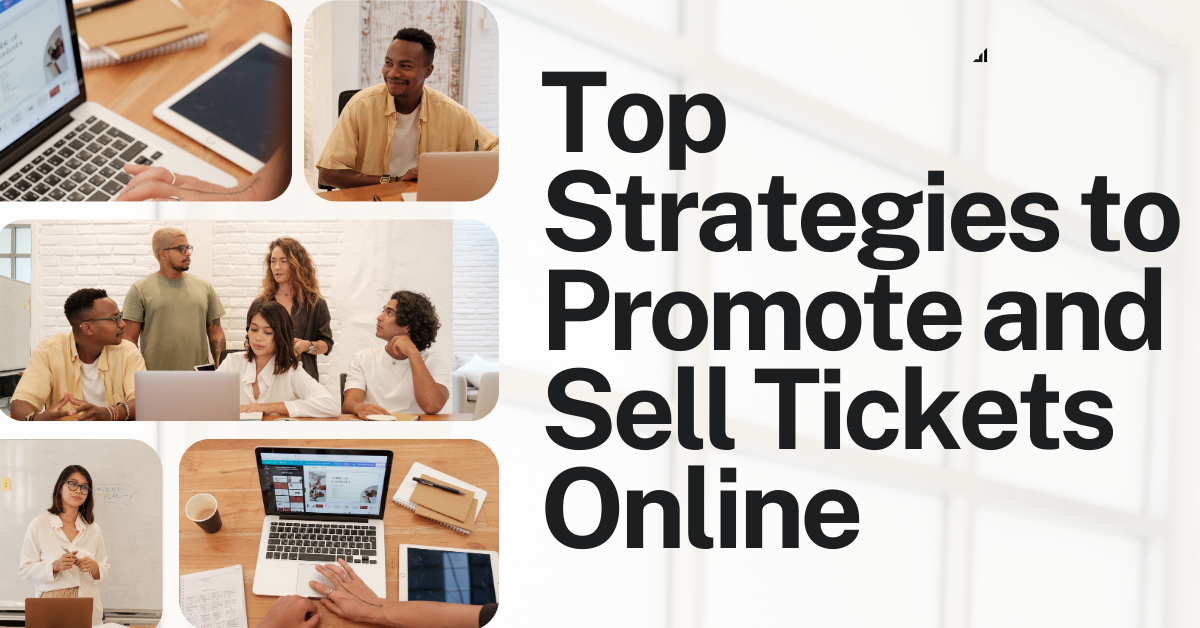In the digital age, promoting and selling tickets online has become essential for event organizers seeking to maximize their attendance. With the widespread availability of online platforms and the power of social media, event promotion and ticket sales have never been more accessible. In this article, we will explore the top strategies to effectively promote and sell tickets online, helping event organizers attract a larger audience and ensure the success of their events.
According to Statista’s Market Forecast, the average revenue per user (ARPU) in the event ticketing market is projected to be $319.30 in 2024 in the United States. Globally, the ARPU in the event ticketing market is projected to be $115.90 in 2024, with an expected user base of 769.0 million users by 2028. The online event ticketing market is estimated to reach $101.94 million by 2029, growing at a CAGR of 4.68% during the forecast period (2024-2029)
Build an Engaging Event Website or Landing Page:
The first step in promoting and selling tickets online is to create an engaging event website or landing page. This serves as the central hub for all event information, including the event details, schedule, location, lineup of speakers/artists, and ticket purchasing options. The website should be visually appealing, user-friendly, and mobile-responsive, ensuring a seamless experience for potential attendees. Clear and compelling calls-to-action should be prominently displayed, directing visitors to purchase tickets or sign up for event updates.
Leverage Social Media Channels:
Social media platforms are powerful tools for promoting events and selling tickets online. Event organizers should create accounts or pages for their events on popular platforms such as Facebook, Instagram, Twitter, and LinkedIn. Consistently posting engaging and relevant content, including event updates, behind-the-scenes sneak peeks, and testimonials from previous attendees, helps generate buzz and interest. Social media advertising tools can be utilized to target specific audience segments, reaching people who are likely to be interested in the event. Contests, giveaways, and partnerships with influencers can also be effective strategies to increase event visibility and ticket sales.
Implement Email Marketing Campaigns:
Email marketing remains a highly effective strategy for promoting events and selling tickets online. Event organizers should build an email list by encouraging website visitors to subscribe or collect email addresses from previous event attendees. Regularly sending out newsletters or targeted email campaigns is crucial to keep potential attendees informed and engaged. Emails should include exciting updates, exclusive offers, and links to purchase tickets directly. Personalization and segmentation based on attendees’ interests and preferences can significantly improve open rates and conversion rates.
Offer Early Bird Discounts and Limited-Time Offers:
Creating a sense of urgency is a powerful tactic to encourage ticket sales. Offering early bird discounts or limited-time promotional offers incentivizes potential attendees to purchase tickets sooner rather than later. These discounts not only reward early supporters but also help generate momentum and buzz around the event. Promoting these offers through various channels, including the event website, social media, and email marketing campaigns, increases the chances of reaching a wider audience and driving ticket sales.
Utilize Influencer and Affiliate Marketing:
Influencer marketing involves partnering with individuals or organizations with a substantial online following and influence to promote events and drive ticket sales. Event organizers should identify relevant influencers within their target audience and collaborate with them to create sponsored content or endorsements. Affiliate marketing programs can also be implemented by offering a commission to individuals or organizations for each ticket sale they generate through their promotional efforts. These strategies leverage the reach and credibility of influencers and affiliates to increase event visibility and ticket sales.
Engage Attendees with Interactive Content and Contests:
Engaging attendees and potential attendees with interactive content and contests helps to build anticipation and excitement for the event. This can include quizzes, polls, video teasers, or interactive challenges related to the event theme or industry. Contests can provide incentives for attendees to share event information or refer friends, offering rewards such as VIP upgrades or exclusive access. These interactive activities not only generate buzz on social media but also create a community around the event, fostering a sense of belonging and increasing attendee loyalty.
Conclusion
Promoting and selling tickets online is crucial for event organizers to maximize attendance and ensure the success of their events. By implementing the top strategies discussed in this article, event organizers can effectively promote their events, attract a larger audience, and drive ticket sales. Building an engaging event website, leveraging social media channels, utilizing email marketing campaigns, offering early bird discounts, engaging influencers and affiliates, and providing interactive content and contests are all powerful strategies to optimize online ticket sales. By combining these strategies with creativity and consistency, event organizers can boost their event attendance and create memorable experiences for attendees.


